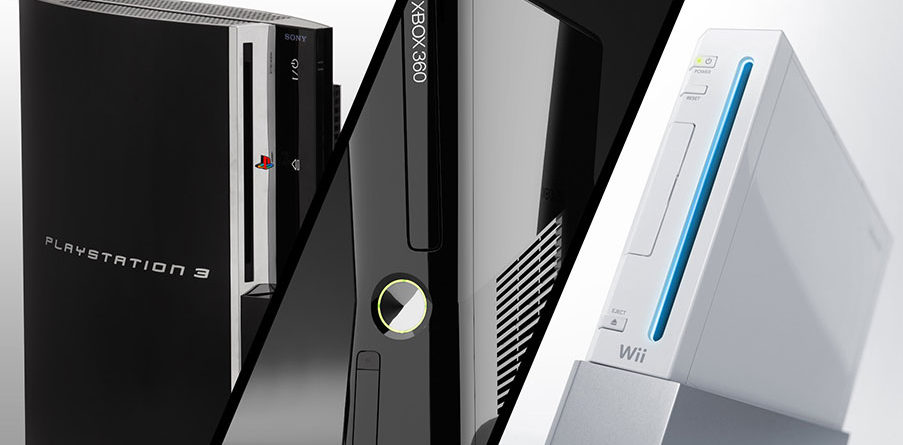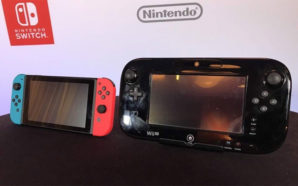The Seventh Generation consoles: Playstation 3, Xbox 360, and the Wii. What these three consoles and their games brought to the medium will never be forgotten. Groundbreaking changes were made — changes that have influenced parts of the gaming spectrum far and wide. From the innovative commercialization of many common standards to the best exclusives of all-time, let’s take a look back at the best time to be a gamer.
Seventh Generation: Technological Leap
In the early 2000s, Sony and Microsoft both asked tech giant IBM to develop processing chips for their future consoles. Over the course of 4-5 years and a $400 million budget (provided by Sony), the companies released Xbox 360 (2005) and PS3 (2006). The processing ability provided by the microprocessors were through the digital roof, with the PS3’s GPU being around 65x times more powerful than the PS2. But enough with the technicalities.
What this did for the seventh generation looked leaps and bounds ahead of anything on the PS2 or Xbox’s catalog. For example, go and compare a relatively late PS2 game like God of War 2 (2007) to the PS3 launch title Resistance Fall of Man (2006). While God of War may look gorgeous in its own right, the technical prowess of Fall of Man cannot be understated given its release in 2006. The seventh generation also introduced native high definition resolutions and in-game shaders, establishing a level of graphics unseen in consoles up to that point.
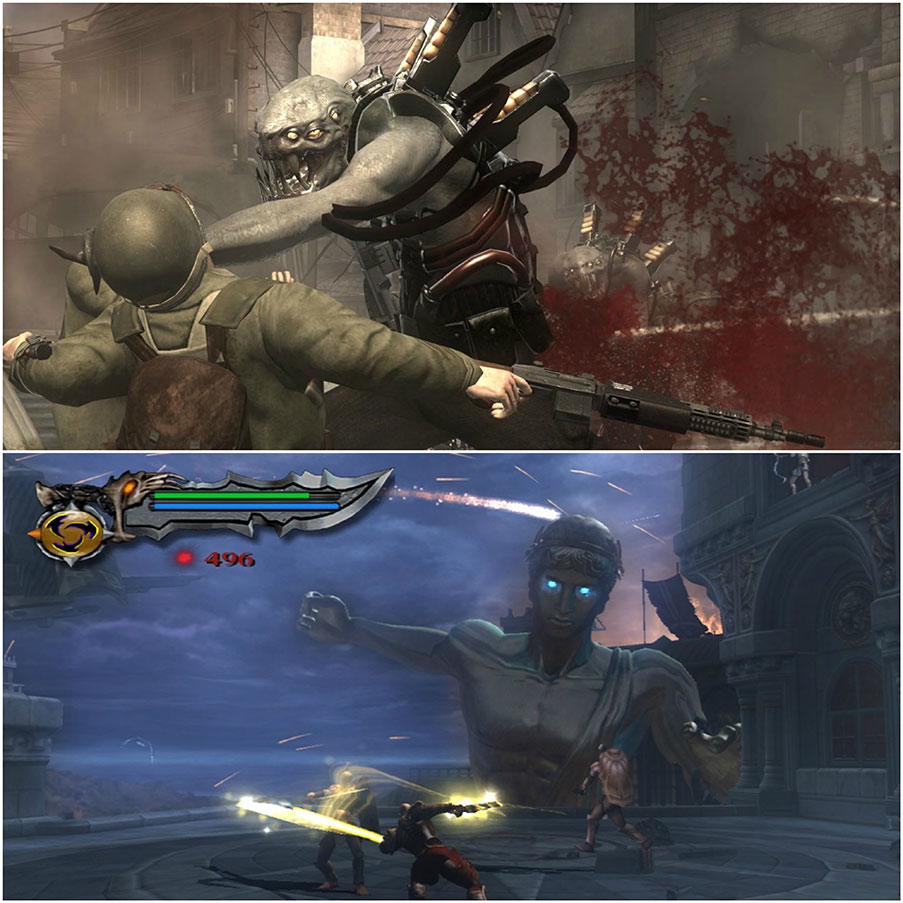
Credit: IGN
Not only did consoles get an unprecedented motherboard update, but certain pieces of hardware have stood the test of time. I am mainly referring to the controllers. The Wiimote and Xbox 360 are the holy grail of gaming controllers. Nintendo had changed the landscape of motion-controlled gaming forever while Microsoft revolutionized wireless connectivity, sleek design, and comfortable play. Although Sony may have developed a superior controller for PS4, Microsoft made an inferior follow-up controller for Xbox One. On the same lines of evolution — even if Nintendo’s subsequent controllers are objectively better (Wii U, Nintendo Switch), they could not revitalize that same sort of innovation that the Wiimote brought in 2006.
The Handheld Consoles
From 1989 to its discontinuation in 2003, the Gameboy solely dominated the handheld gaming market. There were attempts to rival the success Nintendo had achieved, with devices other major gaming companies such as Sega and Atari taking the challenge. However, these failed to even come close. By the time the Seventh Generation of gaming started, two of some of the greatest handhelds were released. These are the Playstation Portable and Nintendo DS.
Sony’s Playstation Portable was a powerhouse in portable technology. It boasted graphics nearly on par with the PS2 and had a screen of an exceptional 4.3 inches. Not only were the graphics great for 2005, but the PSP’s library of games was superb too. PSP games such as Metal Gear Solid Peace Walker, God of War Chains of Olympus, Patapon, and Grand Theft Auto Liberty City Stories garnered universal acclaim.
Nintendo’s DS also provided a hefty amount of innovation. The device’s risky design of a dual screen provided a unique viewpoint for many of their games. Its implementation of touch-screen controls was outstanding and, for better or for worse, laid the groundwork for future smartphone games. It also had many great games such as Animal Crossing, GTA Chinatown Wars, Mario Kart, and Pokemon White.
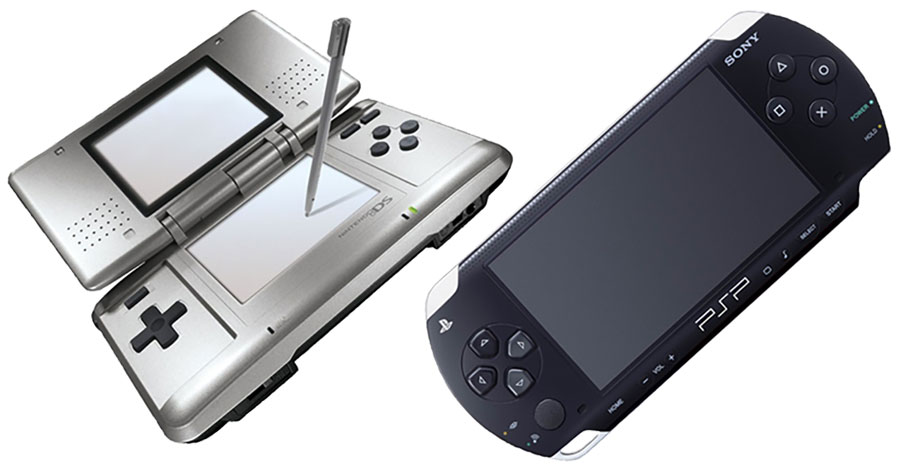
Credit: Skatter Tech
Both of the Eighth Generation follow-ups, Playstation Vita and Nintendo 3DS, owe a lot to these consoles. They heavily resemble their older counterparts and would not have had their similarly positive reception if not for these revelations of the Seventh Generation.
Exclusives & Multi-platform Games
Mainly the reason for this argument, the games released within this generation are some of the greatest of all-time. They also served to redefine medium conventions and act as pieces of art.
Most of all, the exclusives made the Seventh Generation the best time to be a console gamer. The Wii had superb entries in beloved franchises such as Super Mario Galaxy, Zelda: Twilight Princess, and Super Smash Bros Brawl. Over on Xbox 360’s catalog, Halo 3, Gears of War, Fable 2 and Crackdown provided unforgettable, action-orientated gameplay. For PS3, Masterpieces like The Last of Us, Heavy Rain, Journey, God of War 3, and Uncharted 2 treated gamers to cinematic gameplay and dense storylines. All of these games were the reason the console war was a justly long-fought battle, as each platform had a stellar lineup.
There were also brilliant multi-platform games that were some of the all-time best in their genre. Open world Masterpieces such as Red Dead Redemption and Skyrim captivated viewers with immersive settings, solid storylines and a staggering amount of player opportunity that is yet to be equaled as effectively. First-person shooters such as Call of Duty 4 and the earlier mentioned Halo 3 redefined the market demand for online play as well as the FPS genre as a whole. Indie games started gaining a whole new audience through hits such as Minecraft and Hotline Miami. Each genre had their own revolutionary titles and went through an evolutionary stage.
Video Games As Art
Some titles released during the Seventh Generation had a lot to convey for themselves. Bioshock was a first-person shooter with an artistic twist. Players were placed in a location more imaginable and detailed than 99.9% of all games: Rapture. It was a city under the sea but creative director Ken Levine made it seem plausible by establishing an incredibly believable backstory about objectivism and individuality. This was unique not only for its profoundness but because these themes are delivered in lore. To top it all off, Bioshock had an expressionist art style filled with exaggerated colors to give the locales a life of their own.
Journey, a PS3 exclusive, is also worth noting. It built itself around an emotional arc, letting players explore a desert with seemingly no objective. This was quite unheard of, since most games have a goal to meet. Roger Ebert (film critic) said that games could never be art because of this natural design. Journey pretty much disposed of most storyline and objective, letting environmental design take over for player guidance.
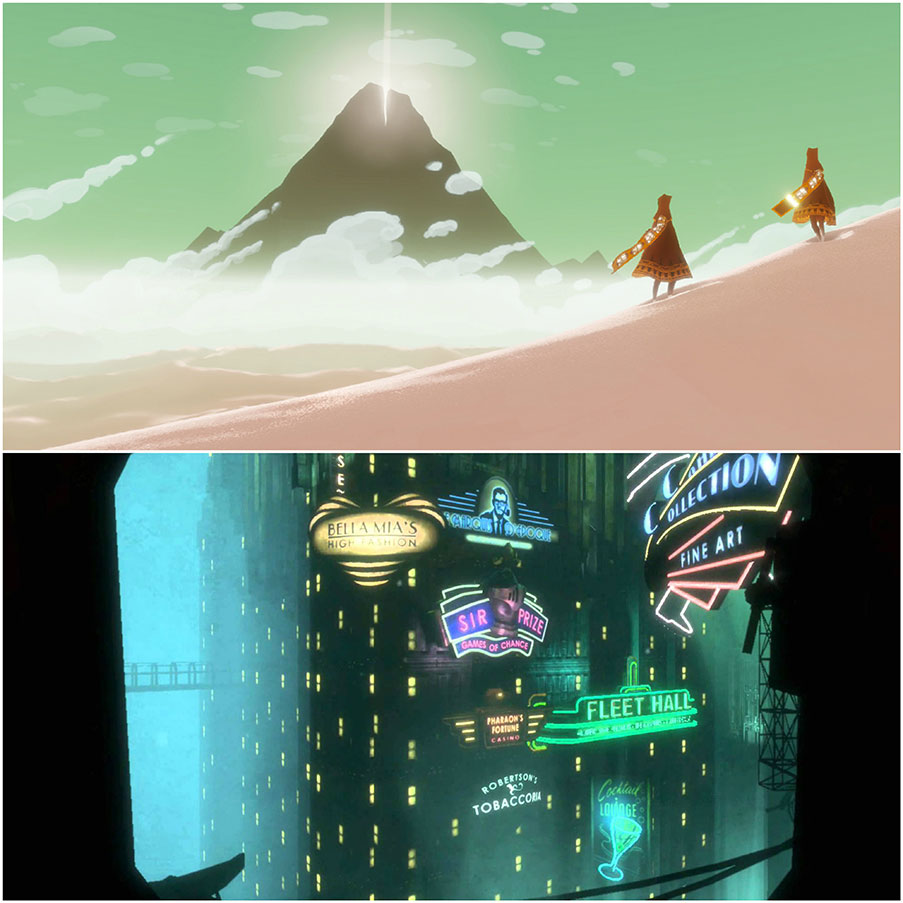
Credit: Hypercritical.co
Eighth Generation Fatigue
On review aggregation website Metacritic lies a ranking of all PS4 games. If you look at the PS4’s top 20 highest rated games, there are 6 games from the Seventh Generation. In Xbox One’s top 20, there are 4 games. Finally, the Wii U has a disappointing amount of 6. When compared to PS3 and 360’s rankings, there are no remasters in the top 20 (the Wii, however, has 3). You could argue that these consoles are older but that is not the case. The Eighth Generation, in nearly its fifth year, has simply not enjoyed the same quality of games. I do not mind remasters, but the amount of them included in these lists speak a lot.
There is a reason GTA V and Last of Us hold the top spot for PS4. They were triple A games that used their budget to the highest degree. Creatively, they changed a lot, with particular credit to Last of us. It invoked emotional power with unparalleled character chemistry and raw action. Naughty Dog’s Uncharted 4 was superb, but a unique IP like The Last of us has yet to be replicated. GTA V revolutionized the open world genre because Rockstar refined their formula to its most polished state yet.
Hopefully, there is a chance that the Eighth generation could best its, so far, superior descendant. Games such as Red Dead Redemption 2, The Last of Us 2 and the God of War reboot could land this generation closer to the legendary library it deserves. For now, though, we only have a handful of games that can truly be labeled as modern greats. When this generation does get full steam (and not that kind), lest we do not forget the Seventh.




